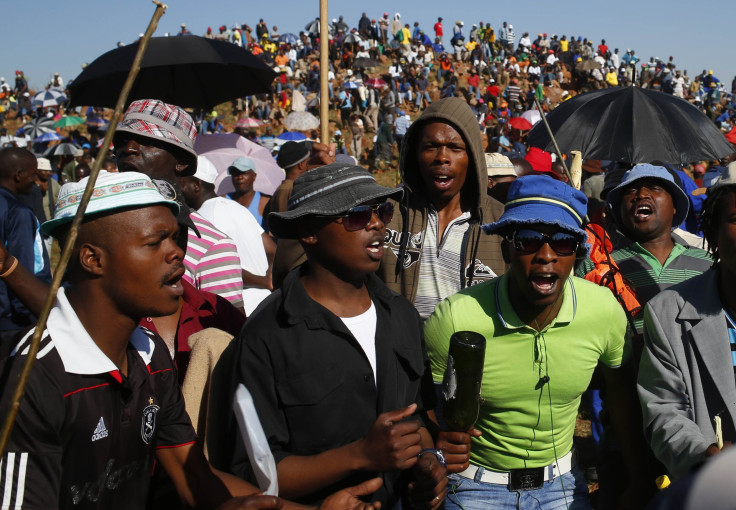Firings, Assaults, Police Raids Escalate Tense Labor Situation In South Africa's Mines

Ongoing labor strife in South Africa entered a new and dangerous phase this week after negotiations between wildcat strikers and mining companies -- those hardest hit by recent employee actions -- broke down.
Deadly confrontations between miners and the police, mass firings and increasing assaults on workers who had decided not to join the strikes have all been front page news in Johannesburg over the past few days, as both labor and management appear to have dug in for what could be a protracted and violent fight. The country's main labor unions, meanwhile, have essentially washed their hands of the whole affair, taking the position that while that the bulk of the strikes were never officially sanctioned, that's the corporations' problem to solve now.
“The companies are playing hardball,” Andrew England, South Africa bureau chief for the London-based Financial Times, explained in a blog post on the latest developments in the country, where major miner Gold Fields Ltd. (NYSE:GFI) threatened to fire 23,540 striking employees -- two-thirds of its total payroll -- if they don't return to work by Friday. Earlier in the month, Anglo American Platinum Ltd. (Amplats), the world’s biggest platinum producer, fired 12,000 striking miners, noting that labor unrest had cost the company more than 1.1 billion rand ($126 million) in lost revenue.
Strikes have also shut all seven of AngloGold Ashanti Ltd.'s South African mines, according to the Wall Street Journal, which also noted intimidation of non-striking employees had escalated. Smaller operator Gold One International, also hit by strikes, said it was suspending operations to ensure employee safety "amidst rising intimidation." Other strikers have chosen to seize equipment or occupy mines to force a work stoppage.
Violence has also been directed at the police, who in August were widely vilified for shooting into the crowd at one of the earliest strikes, killing dozens. Tuesday, a striker attacked a police officer with a machete, hacking his arm off, according to Agence France Presse. Retaliation has followed: Workers at an iron ore mine operated by London-based Anglo American, for example, were sitting on dozens of idle trucks at the mine site until a raid by the police Tuesday morning forced them to hand over the equipment.
The crackdown by the corporations and police, however, does not seem to be making a dent in the defiant posture of the striking workers, who are demanding monthly salaries as high as $2,100, an extraordinary raise.
"We want money! The strike continues!" Moses Ngwekazi, one of the action organizers said, speaking to thousands gathered at a rally inside a stadium near a suburb of Johannesburg on Tuesday.
"No one is going to fire us, the strike continues. The employer can't just decide to suspend talks without offering an alternative," Ngwekazi said, according to Radio Netherlands.
It is not clear that there is alternative, however. On Monday, talks between the striking workers, the country's main unions, and the government's mining ministry broke down. Following that setback, and news of the layoff threats, the country's main mining sector union sent out a statement that clearly threw its support behind the wildcat strikers, noting that they wanted "to be on record that the current situation was created by the mine bosses themselves." That was a significant shift from the union's position earlier in the year when, seeing its dominance of the collective bargaining process threatened by the unsanctioned labor actions, it had backed away from supporting the strikes.
The labor unrest is causing an economic hit in the country, with 50 percent of the total mining output temporarily shut down. Deutsche Bank estimates that a prolonged strike could cause a decline of 2.5 percent in GDP, according to a report cited by London's Telegraph. And that's not even taking into account a dynamic seen in other industries, such as trucking or car manufacturing, that are being affected by disruptions in logistics or sympathy strikes. Some 180,000 municipal workers are contemplating joining the strikes, according to Al Jazeera, which said prices of basic commodities are going up and people in upscale parts of Johannesburg -- one of the most economically balkanized cities in the world -- are panicking.
“The current impasse is extremely unfortunate, not only for the industry and its employees, but also for future growth and development in South Africa,” Elize Strydom, the national mining industry body’s senior executive for employer relations, said in a statement to Bloomberg.
© Copyright IBTimes 2024. All rights reserved.











